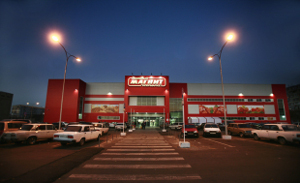 MGNT), last year’s Russian stock-market darling, is turning into one of this year’s laggards.
MGNT), last year’s Russian stock-market darling, is turning into one of this year’s laggards.The country’s largest retailer dropped to a 12-month low last week as a surprise interest-rate increase by Bank Rossii sparked concern that a slowdown in consumer spending will deepen.
After a resilient retail industry formed one of the few bright spots last year for an economy that grew at its slowest pace since 2009, higher lending costs are sapping consumer demand just as the nation struggles to contain the economic and political fallout from its push into neighboring Ukraine.
Magnit’s global depositary receipts fell 3.8% to $45.50 on April 25 in London, extending its worst weekly decline since 2011 to 13%. The stock is down 31% this year after soaring 65% in 2013. The Bloomberg Russia-US Equity Index sank 7.9% last week as the truce forged to ease tension in eastern Ukraine unraveled, fueling concern that President Vladimir Putin faces stiffer international sanctions.
“The economy is plunging into recession and investors are concerned particularly with retail stocks -- who has money to buy more stuff?” Ilya Kravets, the New York-based director of investment research at Daniloff Capital LLC, said by phone on April 25. “There are so many factors that point to a difficult time for retailers. The central bank raises interest rates and makes credit more expensive. That’s just another blow.”
Surprise Increase
Policy makers unexpectedly raised Russia’s one-week auction rate to 7.5% from 7% on April 25, while Standard & Poor’s cut the nation’s credit rating to one level above junk, saying further downgrades are possible if economic growth deteriorates and wider sanctions are imposed. The central bank made what it called a temporary increase from 5.5% in March after Putin secured lawmakers’ approval to send troops into Ukraine.
Timothy Post, head of investor relations at Krasnodar, Russia-based Magnit, was not available for comment when contacted by phone and e-mail outside of normal business hours on April 25.
The annexation of Crimea from Ukraine last month prompted the US and the European Union to introduce sanctions against Russia, threatening to tip the $2 trillion economy into recession. The standoff, the worst since the end of the Cold War, intensified capital flight and triggered a selloff in Russian financial markets.
While Magnit rallied 65% in London trading last year, it soared 91% in Moscow, making it the best performer on the Micex. Its advance was followed by OAO Aeroflot, the nation’s biggest airline, with an 87% advance. OAO M.Video had jumped 24% last year.
‘Expensive Money’
“Money is getting more expensive and that is going to have an impact on all sectors, including retail,” Alexander Morozov, chief economist for Russia at HSBC Holdings Plc, said in a phone interview from Moscow. “Retail sales will continue to slow down and the sector overall looks very weak because of declining disposable incomes and a slowdown in consumer lending.”
Real disposable incomes fell 6.8% in March from a year earlier after a revised 0.6% increase in February, the Federal Statistics Service in Moscow said earlier this month. Gross domestic product may expand less than 0.5% this year or not grow at all, Finance Minister Anton Siluanov said on April 15. GDP grew 1.3% in 2013, the slowest pace in four years.
Higher costs on lending will curb retailers’ expansion plans, said HSBC’s Morozov.
Economic Engine
“The retail sector has been an engine of Russian economic growth and a slowdown in the sector means slower growth overall,” he said.
S&P reduced Russia’s rating to BBB- from BBB while saying more downgrades are possible if the economy deteriorates and the U.S. and Europe expand sanctions.
X5 Retail Group NV (FIVE), Russia’s largest supermarket chain after Magnit, fell 2% to $17.15 in London on April 25. The drop trimmed the stock’s increase for the year to 2.3%.
Futures on Russia’s RTS Index declined 1.1% to 106,710 in U.S. hours on April 25 while RTS volatility index gained 2.6% to 45.77. The Market Vectors Russia ETF (RSX), the biggest U.S.-traded exchange-traded fund that holds Russian shares, slipped 9.4% to $21.74 last week.
United Co. Rusal, the world’s biggest aluminum producer, rose 0.3% to HK$3.53 at 10:38 a.m. in Hong Kong trading. The MSCI Asia Pacific Index lost 0.4%.







